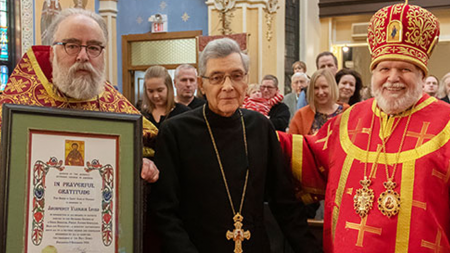Seminarians share outstanding papers at St. Vladimir’s Graduate Conference

Seminarians once again showcased some of their outstanding work at St. Vladimir’s third Graduate Conference (formerly known as the Academic Symposium). The latest edition of the biannual conference was held Friday, January 15, 2021, in an online format.
The conference provides a platform for seminarians to present and discuss the best academic work done by students the previous semester.
“I'm able to see improvement from our first [conference] in January 2020…,” said Academic Dean Dr. Ionut Alexandru Tudorie. “And I'm very happy and thankful to our students and our professors.”
Seminary faculty, led by Dr. Tudorie, nominated nine papers to be featured during the conference. Authors of select papers will be encouraged to submit them for publication in St. Vladimir’s Theological Quarterly. The papers addressed a wide range of topics, including the need for an authoritative catechism for the Orthodox Church in America and biblical exegesis of Christ’s commandment to buy a sword in Luke’s Gospel.
"Obviously, a sword is unusual considering the character of Jesus and his mission—how do we make sense of this?” asked Subdeacon Daniel Hanna, a second-year seminarian, as he introduced his paper, “You Are in a War, Sell All You Have and Buy a Sword: Exegesis of Lk. 22.35–38.” He then argued if one is to interpret the sword allegorically, the same approach must be applied to the other provisions—purse, bag, and garment—mentioned in the narrative.
Subdn. Daniel Hanna is a second-year seminarian in the Master of Divinity (M.Div.) program.
The other seminarians whose papers were featured with Subdn. Daniel were Alexander Earl (“No One Can See My Face and Live: Theophanic Hermeneutics in Scripture and the Eastern Christian Tradition,” and “Hiddenness and Manifestation: Theophanic Realism and Divine Energeia in St. Gregory Palamas”); Hieromonk Michel Mikhail (“God’s Inscrutable Providence: Understanding The Inclusion Of Women In Mathew’s Genealogy”); Blake (Silouan) Cohen (“The Need for An Authoritative Catechism for the Orthodox Church in America”); Tiberiu-Georgian Opriș (“Mark 15.39 – A Confession of Faith or a Sarcastic Comment?” and “Theophanies as Weapon against Ideology and Criterion of Authentic Christianity: The Vision of Hieroschemamonk Nil Dorobanțu”); Subdn. Basil Paul (“The Nuptial Mystery of the Cross in the Gospel of John”); Fr. Abey George (“An Analysis of the Theological and Rhetorical Components of the Homilies of Metropolitan Mathews Mar Barnabas”); Dn. Tesfay Rezene (“A Comparative Study of Indian and Abyssinian Church History: From the Apostolic Age to the Arrival of the European Missionaries”); and Subin Shaji (“An Analysis of the Coptic and Ethiopian Orthodox Church Relationship as a Model for Reconciliation in the Malankara Church”).
The presentation of each student paper was followed by questions and discussion with other seminarians and faculty.
Dr. Rossitza B. Schroeder, the Seminary’s associate professor of art history, delivered the keynote address, “Contemplating Paradox and Asymmetry: Looking at Monosandaloi in Late Byzantium.”
The Graduate Conference is currently an intramural event, but the Seminary plans to invite other Orthodox seminaries to participate in the future.




